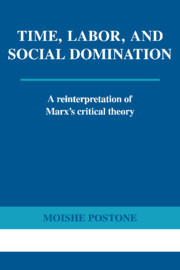Book contents
- Frontmatter
- Contents
- Acknowledgments
- Part I A critique of traditional Marxism
- Chapter 1 Rethinking Marx's critique of capitalism
- Chapter 2 Presuppositions of traditional Marxism
- Chapter 3 The limits of traditional Marxism and the pessimistic turn of Critical Theory
- Part II Toward a reconstruction of the Marxian critique: the commodity
- Part III Toward a reconstruction of the Marxian critique: capital
- Selected bibliography
- Index
Chapter 2 - Presuppositions of traditional Marxism
from Part I - A critique of traditional Marxism
Published online by Cambridge University Press: 10 November 2009
- Frontmatter
- Contents
- Acknowledgments
- Part I A critique of traditional Marxism
- Chapter 1 Rethinking Marx's critique of capitalism
- Chapter 2 Presuppositions of traditional Marxism
- Chapter 3 The limits of traditional Marxism and the pessimistic turn of Critical Theory
- Part II Toward a reconstruction of the Marxian critique: the commodity
- Part III Toward a reconstruction of the Marxian critique: capital
- Selected bibliography
- Index
Summary
Value and labor
The approach I have begun to outline represents a fundamentally different sort of critical theory than the traditional Marxist critique of capitalism. It calls into question the traditional understanding of the nature of capitalism and its basic contradiction between the “forces” and the “relations” of production, as well as the traditional conception of socialism and the historical role of the working class. This approach does not merely supplement the traditional view of capitalism—that is, the primary emphasis on the market and private property—with a critique of the form of production. Rather, it reconceptualizes the nature of capitalist society itself on the basis of an interpretation of Marx's theory as a historically specific critical theory of modern, capitalist society—one that rests upon a critique of labor, of the form of mediation and of the mode of producing in that society. Such an approach, suggested by the reading of the Grundrisse outlined above, entails a critique of the basic assumptions of traditional Marxist interpretations, and implies the need for a fundamental reinterpretation of the central categories of Marx's mature critical theory.
In order to elucidate the various dimensions of such a categorial reinterpretation, I shall begin by analyzing more closely the presuppositions of the traditional Marxist critique. (As noted above, this work is not a survey of Marxist thought but, in part, an explication of the assumptions underlying all forms of traditional Marxism, however those forms may differ in other respects.)
- Type
- Chapter
- Information
- Time, Labor, and Social DominationA reinterpretation of marx's critical theory, pp. 43 - 83Publisher: Cambridge University PressPrint publication year: 1993



